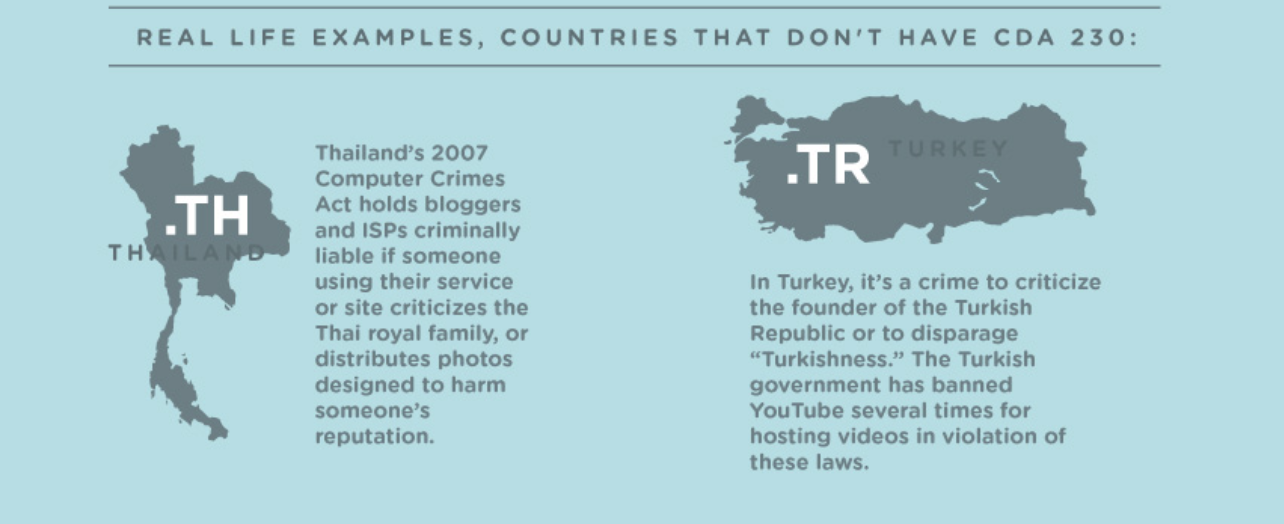If it weren’t for Section 230, one Harvard student likely wouldn’t have seen so much success with his website built to rate female classmates’ attractiveness. Teachers wouldn’t have to remind students that Wikipedia isn’t a proper source. And hedge funds wouldn’t panic at the mention of particular subreddits. None of these sites, or the Internet we’ve known for two and a half decades, would exist. So what exactly is Section 230 of the Communications Decency Act (CDA)?
The Law That Created the Internet
Of course, we know that computer scientist Tim Berners-Lee is responsible for the World Wide Web. But how we got from 1990s message boards to today is a direct result of the 1996 Act signed into law by President Bill Clinton. Initially, the law was designed to limit free speech on the Internet. Thanks to a Supreme Court case, most anti-free speech sections of the Act were struck down and Section 230 remained. Part of that section is referred to as “The 26 Words that Created the Internet”—there’s even a book on Section 230 with that title.
"No provider or user of an interactive computer service shall be treated as the publisher or speaker of any information provided by another information content provider." (47 U.S.C. § 230)
Allow us to translate to 21st-century terminology: No platform can be held liable for content posted by its users. Think comment sections, forums, social media, even Craigslist posts. Without Section 230, any website could be held legally responsible for the crazy things people post on it. Think about that—in 1996, hardly any well-known Internet brands existed. (Well, AOL was pretty big. But that statement alone should give you the lay of the land.) And without this protection, they likely would never have appeared in the first place. The point of 230 was to open up the Internet to expansion and creation—to turn it into the vital resource we enjoy today. It’s notable that the United States is the only country with such a law, which is why most major Internet companies are based in the United States.

Section 230 and Moderation
The First Amendment blocks Congress from telling companies what they can or cannot allow on their platform, but somebody had to keep an eye on questionable content. That responsibility falls to companies protected by Section 230. Thanks to the protections, they could experiment with moderation tactics. For example, a private company like Twitter can decide which tweets or profiles to remove and block based on their guidelines and judgment without interference from the government.
Ernesto Falcon of the Electronic Frontier Foundation (EFF), a group heavily involved in the Supreme Court case around the CDA, suggests that without this allowance, companies likely wouldn’t bother moderating at all. The sheer number of lawyers they’d have to keep on retainer coupled with the impossibility of monitoring posts in real-time, means that most sites would remove content en masse if there was a hint of a complaint.
Without 230, as Falcon discusses, the lack of moderation would make the Internet the Wild West of hate speech and misinformation that the law tried to prevent in the first place. The problem now, with an Internet developed far beyond what 1990s legislators may have dreamed, is that experimental moderation tactics aren’t enough.
Section 230 Reform
Section 230 is central to the Internet as we know it. But reform is past due. After all, the law is old enough to rent a car as of February 2021. Big Tech has too long gone unchecked in their moderation practices. From Instagram shadowbanning to rampant misinformation across platforms, cyberspace is too big and especially too powerful to continue with 25-year-old guidelines.
The debate over changes to 230 isn’t new, but it’s back in the spotlight after January 6, 2021, and the subsequent moderation of Donald Trump’s online presence. The trouble is—as it always was—is how to thread the needle of updating Section 230 to hold “interactive computer services” to some level of accountability without destroying the central protections that allowed the Internet to flourish in the first place. Congress has its work cut out for it even before you factor in the partisan quibbling that’s blocked reforms in the past, and continues to impede current discussions and proposed reform bills.

